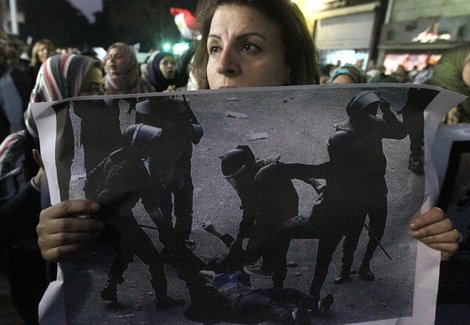CAIRO: Business as usual just isn’t going to cut it anymore. That is the core message of Egypt’s Human Development Report for 2005. The in-depth study released yesterday by the United Nations Development Program (UNDP) in collaboration with Egypt’s Institute of National Planning, calls for the intense modernization of social services and utilities for ensuring long-term development of human security.
With Egypt’s stunning African Cup win still fresh on the minds of conference participants, representatives from the government and UNDP expressed that the patriotic unity demonstrated by Egyptians nationwide last weekend is a clear indication of their ability to mobilize as a nation.
“What we witnessed in the African Cup is that Egyptians have a huge sense of belonging, explained Prime Minister Ahmed Nazif. “How can we translate that into real active power? How can we make those young people concerned about problems in the environment? This report gives us a lot of issues and ideas.
“We must expand on social, economic and political reforms with the participation of the civil society, adds Osman Mohammed Osman, minister of planning and chairman of the board for the Institute of National Planning. “Such initiative will instill momentum and growth in all citizens.
The report, entitled “Choosing our Future: Towards a New Social Contract discusses the endeavor to establish harmony between the government and civil society. Despite steady economic progress on a national level, researchers at UNDP propose targeting setbacks at local and regional levels, particularly in the more impoverished parts of the country. Researchers call upon the private sector to commit to the expansion of investment, as well as to the quality of exports and the efficiency of manpower.
“We are in a world where borders are removed, notes Nazif. “We are competing with 6 billion people around us. If we want to export, we must export at an international level. If we want to export manpower, it must be the best quality. No one will have mercy on us if we don’t work hard – if we don’t improve ourselves.
“The report this year has the name of a vision for the future, explained Policy Committee General Secretary Gamal Mubarak. “That leaves us with two alternatives. We can carry on with the present scenario to deal with challenges we are confronting, or embark on an ambitious plan to reform. The main objective of policies over the last few years was to remold the state’s role in order to implement pro-needy reforms. Now we must stress on the public participation and the state’s role to deliver services to the needy.
The 230-page report highlights five major target points or “Millennium Development Goals (MDGs), which researchers feel, if alleviated, might greatly empower the “underutilized pool of human resources, in turn, improving the nation. Topping the list is the eradication of illiteracy. UNDP calls for the invigoration of this decade-old goal, emphasizing the leading role civil society can play in achieving this objective.
Greater control of Egypt’s rapidly growing population is the second MDG cited by UNDP. With more than 72 million people, researchers suggest that an accelerated decline in fertility would leave more room for focusing on the 6 million youngsters requiring proper education and health care, and later on, the demand for employment.
Creation of jobs is third on the list, researchers citing three sectors which have the potential to yield the greatest results: export-oriented manufacturing, which includes both goods and services, rural and urban; high-tech services relating to a number of sectors, including tourism, information technology, finance and transport; and finally, personal services.
Fourth, researchers suggest drawing a “roadmap, in which hubs for development, agriculture and industry are relocated to give greater attention to rural, underutilized areas. In the study, great focus is dedicated to the restoration of agricultural land. During his election campaign, President Hosni Mubarak vowed to give back 1 million feddans of desert land to Egyptian farmers in an effort to boost Egypt’s agricultural sector.
Finally, UNDP stresses the importance of safe drinking water and sanitation to avoid renal failure and water-borne illnesses. The study analyzes a number of sanitation methods with regard to quality and cost effectiveness. It proposes that the distribution of sanitation at the local level will yield lower-cost options.
“The government has built schools; we have literacy services; we make sure to provide clinics so that people will go to get health services, explains Nazif. “We want a healthy community. All I’m asking you to give us is to improve yourself.
“This report says let’s build on the successes of the past, but let’s also fill the gaps. Gaps in poverty and social development, notes Antonio Vigilante, UNDP’s regional representative. “You can say ‘everyone is pro-poor, pro-environment,’ but the special quality of this report is it says how to get there. It goes beyond political correct support and goes into details of how to do it, because in a word, that has been abused.



